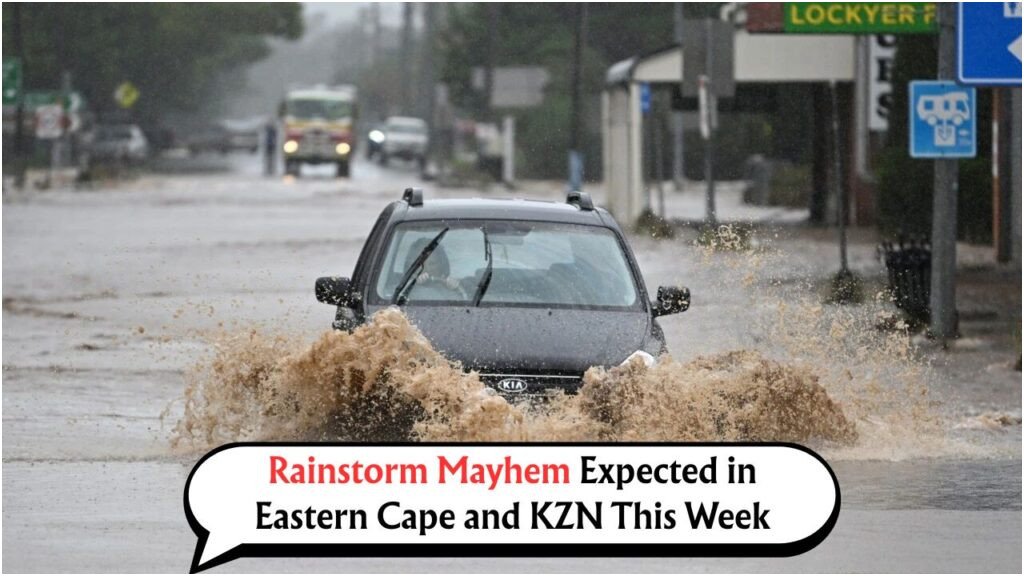Emergency Alert Issued: Torrential Rain Threatens South Africa’s KZN and Eastern Cape: Torrential rain has been forecasted for the regions of KwaZulu-Natal (KZN) and the Eastern Cape, prompting an immediate emergency alert. The South African Weather Service has issued warnings about potential flooding, landslides, and severe weather conditions that could lead to significant disruptions. Residents in these areas are urged to stay informed and take necessary precautions as the weather event unfolds. This alert comes as part of the government’s ongoing efforts to improve disaster preparedness and ensure community safety across the nation.
Impact of Torrential Rain on KZN and Eastern Cape Communities
The impending weather conditions are expected to have a profound impact on the communities within KZN and the Eastern Cape. With heavy rainfall anticipated, there is a heightened risk of flooding, which could lead to extensive damage to homes, infrastructure, and local businesses. Residents are advised to prepare for potential power outages and road closures, which may disrupt daily activities and essential services. The government has mobilized resources to assist affected areas, with emergency response teams on standby to provide support where needed. These proactive measures aim to mitigate the impact of the storm and safeguard lives.
- Heavy rainfall expected to cause flooding
- Potential damage to homes and infrastructure
- Disruption to power and water supply
- Road closures likely in affected areas
- Emergency services on high alert
- Community shelters being set up
- Residents advised to secure property
Government Preparedness for Severe Weather in South Africa
The South African government has taken significant steps to ensure preparedness for severe weather events like the one threatening KZN and the Eastern Cape. The Disaster Management Centre has been activated, and coordination with local municipalities is ongoing to provide timely assistance to communities in need. Public information campaigns are being conducted to educate residents about safety procedures and emergency contact points. Moreover, resources such as sandbags and emergency kits are being distributed to vulnerable areas to help minimize damage from flooding and landslides. These measures highlight the government’s commitment to disaster risk reduction and public safety.
| Region | Weather Alert Level | Expected Impact | Emergency Measures | Community Support |
|---|---|---|---|---|
| KZN | High | Severe flooding | Evacuation alerts | Community shelters |
| Eastern Cape | Moderate | Landslides | Road closures | Emergency supplies |
| Durban | High | Infrastructure damage | Power restoration teams | Local volunteer groups |
| Port Elizabeth | Moderate | Localized flooding | Water diversion strategies | Public information sessions |
Local Community Efforts in Response to Weather Warnings
In addition to government initiatives, local communities in KZN and the Eastern Cape are playing a crucial role in responding to the weather warnings. Community leaders and organizations are coordinating volunteer efforts to assist vulnerable populations, such as the elderly and those with disabilities, in preparing for the storm. Neighbours are coming together to secure properties, clear drainage systems, and share resources like food and water. These grassroots efforts are vital in bolstering community resilience and ensuring that no one is left behind during this challenging time. By fostering a spirit of cooperation and mutual aid, these communities are better equipped to withstand the adverse effects of the impending weather.
- Community groups organizing volunteer efforts
- Assisting vulnerable populations
- Securing properties and clearing drainage
- Sharing resources and information
- Strengthening community resilience
- Fostering cooperation and mutual aid
- Preparing for potential evacuations
Importance of Staying Informed During Weather Emergencies
Staying informed is crucial during weather emergencies, and residents in KZN and the Eastern Cape are encouraged to follow updates from reputable sources such as the South African Weather Service and local news outlets. Social media platforms can also be valuable for real-time information but should be used cautiously to avoid misinformation. It is advisable for residents to keep their mobile devices charged, have emergency contact numbers readily available, and ensure that they have access to a battery-powered radio for constant updates. By staying informed, individuals can make timely decisions that could protect their lives and property during severe weather events.
- Follow updates from reputable sources
- Use social media cautiously
- Keep mobile devices charged
- Have emergency contacts ready
- Access to battery-powered radio
Weather Preparedness: Key Actions for Residents
Residents in the affected areas should take proactive steps to prepare for the incoming storm. Key actions include securing loose items around the home that could be blown away by strong winds, checking and clearing gutters to ensure proper drainage, and preparing an emergency kit with essentials such as water, non-perishable food, flashlights, and first aid supplies. Additionally, it is important to have a family emergency plan in place, which outlines evacuation routes and meeting points in case of an evacuation order. By taking these measures, residents can enhance their preparedness and reduce the impact of the severe weather.
- Secure loose items around the home
- Clear gutters for proper drainage
- Prepare an emergency kit
- Have a family emergency plan
| Essential Items | Purpose | Recommended Quantity |
|---|---|---|
| Water | Hydration | 3 litres per person per day |
| Non-perishable food | Nourishment | 3-day supply |
| Flashlights | Lighting | 1 per household member |
| First aid supplies | Medical emergencies | 1 kit |
| Battery-powered radio | Information | 1 |
| Extra batteries | Power supply | Varies |
| Important documents | Identification | 1 set |
Emergency Contact Information and Resources
While it is crucial not to provide departmental contact details, residents are encouraged to familiarize themselves with local emergency numbers and resources. Knowing how to access municipal services, community support groups, and national helplines can be invaluable in a crisis. Additionally, staying connected with neighbours and community leaders can provide additional support and information during emergencies. By building a network of contacts and resources, individuals can enhance their ability to respond effectively to severe weather situations and ensure their safety and well-being.
- Familiarize with local emergency numbers
- Access municipal services and support groups
- Connect with community leaders
- Build a network of contacts
FAQ Section
| Question | Answer |
|---|---|
| What areas are affected by the emergency alert? | The alert affects KwaZulu-Natal and the Eastern Cape. |
| What are the potential impacts of the torrential rain? | The impacts include flooding, landslides, and damage to infrastructure. |
| How can residents prepare for the storm? | Residents should secure their property, prepare emergency kits, and have an evacuation plan. |
| Where can I find reliable weather updates? | Reliable updates can be found from the South African Weather Service and local news outlets. |
| What should be included in an emergency kit? | An emergency kit should include water, non-perishable food, flashlights, and first aid supplies. |
Stay Safe During Weather Emergencies
Being prepared and staying informed are key to staying safe during weather emergencies in South Africa. By following the guidelines and taking proactive steps, residents can protect themselves and their loved ones from the adverse effects of severe weather conditions.
Community Support and Resources Available
South African communities are known for their resilience and solidarity in the face of adversity. Numerous support networks and resources are available to assist those affected by the weather emergency. Community centers, local NGOs, and volunteer groups can provide essential services and support to those in need. By tapping into these resources, residents can receive the help they need to navigate the challenges posed by the storm, ensuring that everyone has the support they need to overcome the crisis.
- Community centers offering support
- Local NGOs providing resources
- Volunteer groups assisting residents
- Access to essential services
Preparedness for Future Weather Events
As climate change continues to influence weather patterns, preparedness for future weather events is increasingly important. Learning from past experiences and improving disaster response strategies can enhance community resilience. Investing in infrastructure improvements, updating emergency plans, and fostering a culture of preparedness are critical steps in ensuring that South Africa is ready to face future weather challenges. By building on current efforts, the nation can better protect its people and resources from the impacts of severe weather.
- Investing in infrastructure improvements
- Updating emergency response plans
- Fostering a culture of preparedness
- Learning from past experiences
Conclusion: Ensuring Safety and Resilience
Community Efforts Are Essential
Stay Informed and Prepared
Government and Community Collaboration
Mitigating Impact Through Preparedness
Working Together for a Safer Future





